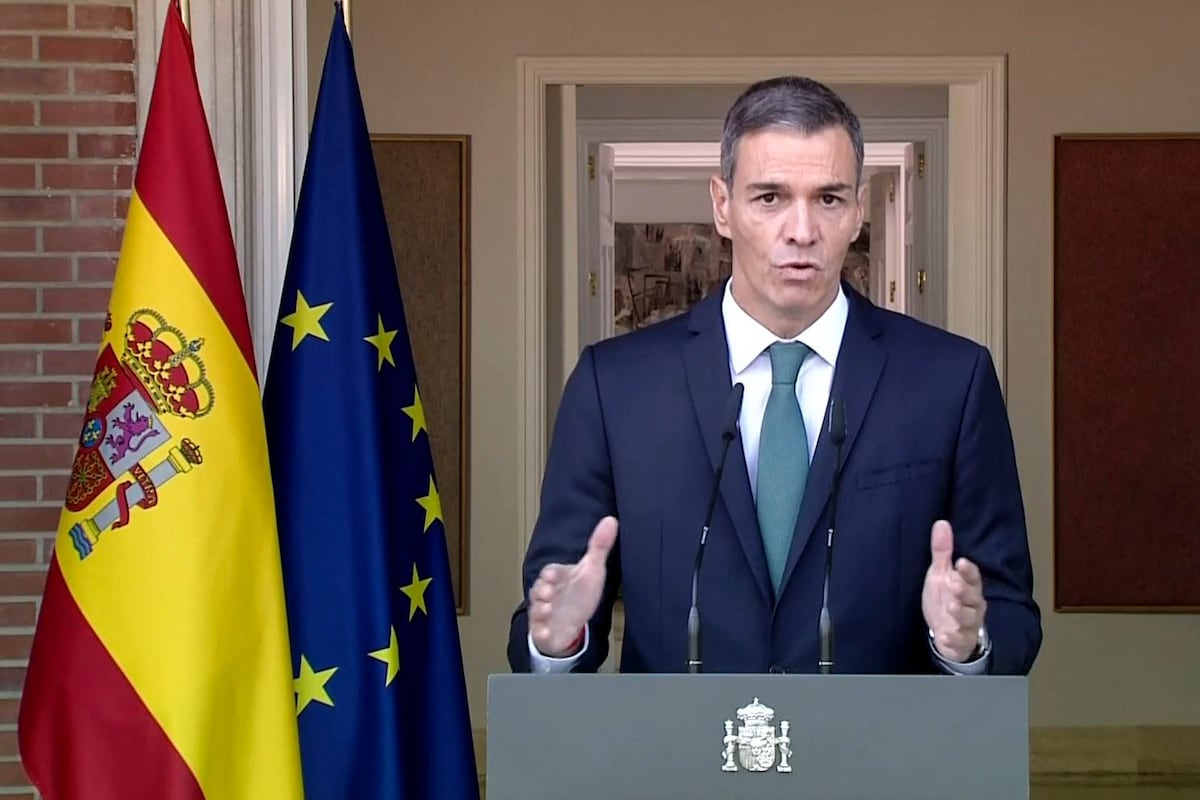Spanish Prime Minister Pedro Sánchez has taken a legal and rhetorical leap in response to the attacks on Gaza ordered by Israeli Prime Minister Benjamin Netanyahu. For the first time, Sánchez openly used the word “genocide” to describe the military offensive against the people of Gaza —something the Spanish government had avoided for many months, generating an internal debate within the governing coalition made up of Sánchez’s Spanish Socialist Party (PSOE), which resisted using the term, and the smaller left-wing party Sumar, which advocated it openly. Defense Minister Margarita Robles had used the word in 2024 and was subsequently reprimanded for it.
Sánchez has announced even more forceful measures, including a decree — which will be approved by the Spanish Cabinet on Tuesday and must be ratified by Congress — that legally enforces what was already happening in practice. According to Sánchez, this entails a total embargo on the purchase and sale of arms to Israel, as well as eight additional measures designed to prevent ships or aircraft that might carry fuel or support to the Israeli military from docking or landing in Spain.
Sánchez began his address with a measured acknowledgment of the historical suffering of the Jewish people, seeking to preempt accusations of antisemitism, including from the Spanish political right. “The Jewish people have suffered countless persecutions, deserve to have their own state, and to feel secure. That is why the Spanish government has condemned Hamas’ attacks from day one,” he began, immediately following with the accusation of genocide: “There is a difference between defending your country and bombing hospitals or starving innocent children. This is an unjustifiable attack on the civilian population, which the U.N. rapporteur has described as genocide. Sixty thousand dead, two million displaced, half of them children. This is not self-defense, it is not even an attack — it is the extermination of a defenseless people and a violation of every international law.”
Sánchez made it clear that Spain is going further than most countries, especially European nations. Spain was the first to recognize Palestine, something some other countries are doing months later, and now Sánchez wants to lead again. The prime minister criticized his allies’ hesitation: “The great powers end up stuck between indifference and complicity,” he said.
Sumar had also called for Spain to break relations with Israel or at least recalling the ambassador, but PSOE rejected this idea. Consequently, Sánchez has announced nothing regarding a diplomatic break. Sources from the Foreign Ministry explain that such a move, also advocated by the party Podemos, would be counterproductive and harmful for Palestine. Spain, they emphasize, supports a two-state solution and therefore seeks to contribute to resolving the conflict. Breaking ties would exclude Spain from that process. Indeed, no Arab country — especially those critical of Israel — has severed relations, nor has the Palestinian Authority. Not even Russia has cut ties, because dialogue is always necessary to seek solutions and assist Palestinians.
Sánchez also acknowledged that the impact of these Spanish measures is limited, as Spain is not a decisive actor in this conflict, unlike the United States. Yet he insisted that Spain can at least do what is within its power to show a path forward. “Spain does not have nuclear bombs. We cannot stop the Israeli offensive alone, but we will not stop trying,” said Sánchez. “We have promoted U.N. resolutions, sent humanitarian aid to Gaza, halted arms sales to Israel, and advanced recognition of Palestine. We have fought against indifference to offer a horizon of hope to the Palestinian people.”
Among the measures, in addition to the decree and ban on ships and aircraft carrying military material or fuel for the Israeli army, there will be a ban on entry into Spain for “all those participating in the genocide” — including Israeli government officials and military personnel.
Spain will also increase its presence at the Rafah border and provide more support to the Palestinian Authority, adding €10 million ($11.7 million) more to the United Nations Relief and Works Agency for Palestine Refugees in the Near East (UNRWA), which sustains Palestinians, and another €150 million ($175 million) in humanitarian aid. Furthermore, Spain will prohibit “the import of products from illegal settlements in Gaza and the West Bank, with the aim of combating these occupations.”
“We hope these measures will add pressure and help alleviate some of the suffering. In one of the most infamous episodes of the 21st century, at least citizens should know that Spain was on the right side of history,” Sánchez concluded.
The government believes these actions place Spain at the “vanguard” of pressure on Israel to halt what Sánchez now openly calls genocide.
Israel’s reaction was immediate. Israeli Foreign Minister Gideon Saar accused the Spanish government of being “antisemitic” and “corrupt,” recalling that Spain expelled the Jews in 1492. Sánchez had, in fact, opened his speech by acknowledging the historic persecutions of the Jewish people, explicitly citing the Holocaust, to close off that line of attack. Israel has also barred entry to Vice President and Labor Minister Yolanda Díaz and Minister of Youth and Childhood Sira Rego. Meanwhile, Díaz has called on Sánchez to go further and recall Spain’s ambassador in Tel Aviv.
Sign up for our weekly newsletter to get more English-language news coverage from EL PAÍS USA Edition

